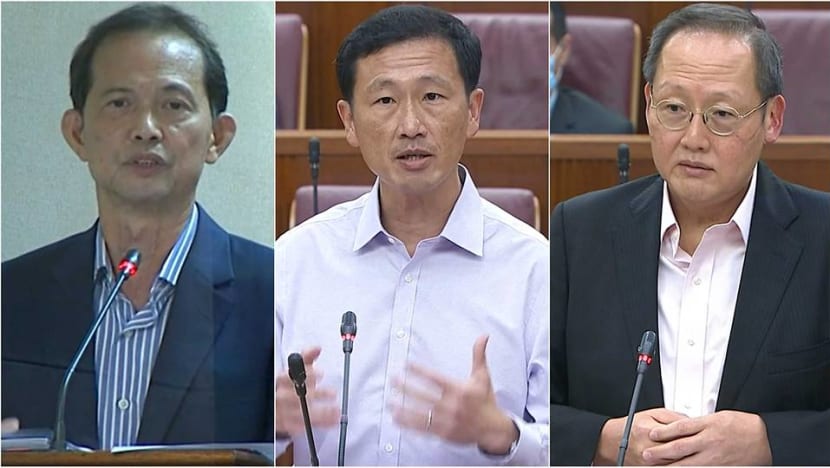PSP raises more questions in debate on foreign worker policies, refuses to retract CECA allegations

NCMP Leong Mun Wai, Health Minister Ong Ye Kung and Manpower Minister Tan See Leng debate Singapore's foreign workforce policies in Parliament on Jul 6, 2021.
SINGAPORE: Progress Singapore Party (PSP) Non-Constituency Member of Parliament Leong Mun Wai raised more questions on Singapore’s foreign worker policies after two ministers delivered statements in response to the party’s questions in Parliament on Tuesday (Jul 6).
Mr Leong refused to back down entirely despite Health Minister Ong Ye Kung pressing him more than once during the debate to acknowledge that some of PSP’s statements about an Indian-Singapore free trade agreement (FTA) were false.
“The whole purpose of this statement is that I know PSP is preparing for a motion debate, but I'm also hoping that we all go into the debate with some common ground … Let's put aside the falsehoods … and don't bring them into the motion,” said Mr Ong.
Mr Leong had previously raised the issue of foreign workers and protecting local jobs in Parliament a number of times. On May 11, Law and Home Affairs Minister K Shanmugam challenged Mr Leong to debate the matter in Parliament.
Mr Leong said in a Facebook post on Jun 22 that he would file related parliamentary questions in July in preparation for filing a motion to debate the matter.
In response to questions filed, Mr Ong and Manpower Minister Tan See Leng on Tuesday delivered statements in an attempt to dispel misconceptions about the India-Singapore Comprehensive Economic Cooperation Agreement (CECA), and on Singapore’s foreign employment policies and situation.
READ: Nothing in CECA implies Singapore must unconditionally let in PMEs from India: Ong Ye Kung
Mr Ong spoke about FTAs and cited his role as a former trade negotiator who had worked on several of Singapore’s trade agreements.
In a debate following the ministerial statements, he asked if the PSP NCMPs would agree that CECA “does not give Indian nationals from 127 professions a free hand to come to Singapore to live and work”, as alleged by PSP.
He and Dr Tan had explained that all Employment Pass holders have to comply with Singapore’s existing regulations and work pass criteria.
“After hearing all the explanation from Dr Tan and I, will you agree to the following? First, the FTAs, including CECA, are fundamental to Singapore's economic survival, and our ability to earn a living and we should not shake this bedrock for political purposes.
“Second, CECA does not allow a free flow of Indian PMEs into Singapore, and this is a gross misunderstanding of the agreement and FTAs in general. Nor is CECA the cause of the challenges faced by our PMEs, and we put a stop to the spreading of the falsehoods.”
READ: FTAs don't give 'unfettered access' to Singapore's labour market; policies must benefit Singaporeans: Tan See Leng
Mr Leong then asked a series of questions on the foreign worker issue. While accepting that FTAs are important for Singapore as an open economy, he said that he was concerned about the “price” Singapore was paying for the trade pacts.
“Are the movement of people or natural persons used as one of the bargaining chips when they are negotiating the FTAs?” he asked.
He also said that the PSP was raising the issue of FTAs and foreign worker inflow because the party had heard a lot of feedback from the ground on this, and hoped to get an explanation from the Government about this.
He continued: “Because our employment policies are already quite relaxed in granting work passes to foreigners, so the Indian nationals don't have to come into Singapore through the CECA route.”
REQUEST FOR DATA
He then requested more figures, asking: “The number to focus on is how many of the respective FTA’s nationals - in the case of CECA, it’s Indian nationals - have come into Singapore and taken up our PMET jobs. What is the share of that as a percentage of our total foreign PMETs, and then our total PMET jobs?”
Mr Leong and Ms Hazel Poa (PSP-NCMP) had asked for data on the number of foreign nationals and their dependants from countries that Singapore has FTAs with in their parliamentary questions.
They had also asked for the profile of Singapore's work pass holders and their dependants - from China, India, the United States and Australia - and the jobs they commonly hold.
Dr Tan said in his ministerial statement such statistics are not published for foreign policy reasons, but he shared some numbers to "address misconceptions".
Ms Poa later asked the ministers if they would provide more information on this in written form, to which Mr Ong said: “There's a limit to what we can do.”
Mr Leong also said that the Government has admitted that Singaporeans have concerns about jobs and job security, but it is a longstanding problem.
“It has been 20 years since we started the foreign talent policy. Within 20 years, we still haven't got our act together in training our people?” he said.
He asked for numbers on the total number of Singaporeans who had been displaced over the last 10 years by foreign workers, and for the number of foreign PMEs in the finance and IT sectors compared to the number of Singaporeans.
LEONG TOLD BY SPEAKER TO "MAKE IT MEANINGFUL"
Mr Leong added: “I think (the) minister might have given some figures just now. The fifth question is, you say that we are not competitive, Singaporeans are not competitive but…”
Mr Leong was then interrupted by Speaker of the House Tan Chuan-Jin who told him to “stick to the facts”, while pointing out that some of the questions Mr Leong raised had been answered.
“I do suggest that you keep to what has been said, a lot of questions have been answered as well. So the idea of the debate is to debate the issues that have been raised. So please do that,” said Mr Tan.
When Mr Leong protested that he was raising questions, Mr Tan said: “You are free to raise questions. Some of these points have been covered, so we will be happy to take the time and debate whatever is meaningful, but please make it meaningful.”
Mr Leong responded: “I don’t know what you mean by ‘meaningful’ because I’m going through those points.”
He then continued to speak about how the Government’s finetuning of Singapore’s foreign workforce policies had come “too little and too late”.
“For example, the foreign talent policy was started in the late 90s or around the year 2000 but the fair consideration framework was only introduced in 2014,” he said.
The fair consideration framework sets out guidelines to prevent discriminatory hiring based on characteristics such as age, gender, nationality or race.
Mr Leong also pointed to Singapore’s education system, asking: “Minister Tan said that there’s simply not enough local talent … Then what happened to our education system? What happened after 20 years, you’re still telling Singaporeans that we (have) not enough talent.”
READ: Free trade agreements are critical to Singapore’s economic survival, says Ong Ye Kung
Responding to Mr Leong’s questions, Mr Ong said that it was a “long list of questions that I’m not sure help us bring the discussion forward” and pointed out that many of the answers were already in the speeches delivered earlier.
He reiterated some points made in his speech but also told Mr Leong that the manpower policies are being constantly reviewed, and they may work for a period of time but then have to be adjusted to different circumstances.
“This process will continue and we will continue to debate in this house on the pros and cons. You can't say, because we implement something new now to respond to the situation, therefore we have failed. ‘Why didn't you do it five years ago’ - it doesn't work like that,” he said.
“Then every Bill that’s tabled in this House is: You have failed, you should have tabled this Bill five years ago. It doesn’t make sense.”
PSP'S POSITION
Mr Ong then pressed the PSP NCMPs to take a position on the questions he had asked them to answer.
Elaborating further on how Singapore has had to keep tweaking its economic and manpower policies, Dr Tan said that Singapore has seen “fairly dramatic transformation” every 10 to 15 years.
“I think it's inconceivable that you would expect that policies that you would enact do not get refined, do not get tweaked and do not get adjusted over time.”
While acknowledging that the Government “can always do better”, Dr Tan said that three-quarters of PME positions are filled by Singaporeans and a quarter are filled by foreign work pass holders. So while they should try to “bring it up” further, the glass is “three quarters full”, he said.
In response to Mr Ong, Mr Leong said that the PSP supports FTAs and are “reassured” that Singaporeans’ interests are “taken care of”. But he said that they have more questions on whether CECA has contributed to the “overall influx” of Indian workers before they can conclude whether CECA is “really neutral to beneficial for Singapore”.
When Mr Ong summarised PSP’s position by saying that PSP “will take back the allegations that CECA has led to an unfettered flow of Indian professionals into Singapore”, Mr Leong objected.
“As to whether CECA has contributed to the influx of some of the PMETs in Singapore in relation to our overall foreign talent policy, we have to explore that. And we don't agree that CECA is net beneficial to Singapore at this stage,” he insisted.
"WAFFLING"
To which Mr Ong said that Mr Leong is “waffling”.
“If you continue to allege, notwithstanding all explanation, I think there is no choice, we have to leave it as such,” he said.
While responding to questions from Leader of the Opposition Pritam Singh (WP-Aljunied) later, Mr Ong returned to this, and reiterated that CECA “does not allow an unfettered inflow of Indian professionals”.
“It is a statement of fact, this is how (the FTA) works, it’s not a matter of your opinion or your perspective,” he said.
“So the logical thing for PSP to do, I felt, is to withdraw the allegations, then we can discuss employment policies, how we can better protect educate, train our workers and these are very legitimate questions. But PSP did not do the logical thing.”
Mr Ong added that if they could not conclude if CECA was beneficial for Singapore, the “honourable” thing to do would be to withdraw the allegations while figuring out the party’s position.
“If because of COVID or during the COVID pandemic, anti-foreigner sentiments, xenophobia creep into our collective psyche, then even if our borders are open, hearts and minds are not and will remain closed, then we will not recover from COVID-19, then we will truly have a long COVID”, said Mr Ong.
“Of all times, this is the worst time - in the middle of a crippling pandemic - to talk about turning inwards, to reject FTAs, reject globalisation. I say we should emerge from COVID-19, announcing to the world that Singapore continues to be that shining jewel in Southeast Asia.”
ON NEED FOR FTAS, STRENGTHENING SINGAPOREAN CORE
Also weighing in, Deputy Prime Minister Heng Swee Keat, who was Singapore’s chief negotiator for CECA, said he was “terribly troubled by the way PSP has taken this”.
“I want to put on record clearly that the Movement of Natural Persons is a very important chapter, but it was not used as a bargaining chip to trade for what else we got,” he said, referring to Chapter 9 of the trade agreement which sets out immigration matters.
Giving more details about the negotiation process, Mr Heng said the Indian negotiators “were very keen” on this chapter, but he had stressed that there must be “very strict agreements” given the difference in population sizes between the two parties.
He recalled that this chapter was one of the two that were “the most difficult to conclude” and “for which (he) never let go”. “And we got what we need,” he added.
Mr Heng also weighed in on Mr Leong’s question about the local education system, noting that he is “extremely proud” of what has been done over the years.
“The World Bank has ranked Singapore the best in the world in educating our people so please do not go around thinking that we have not put in enough effort,” said Mr Heng, who was the Education Minister from 2011 to 2015.
Others who rose during the debate included labour MP Patrick Tay (PAP-West Coast), who called for more to be done to strengthen the “Singaporean Core”, develop the capabilities of the local workforce and protect locals from being unfairly discriminated.
He proposed strengthening enforcement and imposing stiffer penalties for errant companies with discriminatory hiring practices.
READ: Harsher penalties for companies whose hiring practices discriminate against Singaporeans
The application review process for employment passes can also move beyond looking at an individual applicant’s educational qualification and salary, as well as monitoring “sectors with a particular imbalance”, he suggested.
Mr Louis Ng (PAP-Nee Soon) asked if authorities could consider legislating the tripartite guidelines on fair employment practices.
Dr Tan replied that work is under way to refine and strengthen both the Tripartite Alliance for Fair and Progressive Employment Practices (TAFEP) and the Fair Consideration Framework.
“Give us a bit of time,” he said. “We are reviewing it with the different parties because it's a tripartite nature and in the months forward. I should be able to come back and update this House again.”
Nominated MP Janet Ang spoke on the importance of Singapore's network of FTAs, which she said has been a key tool for local businesses to expand overseas. It has now become “even more relevant than before” with the COVID-19 pandemic prompting businesses to explore new markets and supply sources, she said.
With the pandemic also accelerating the need for digital transformation, Singapore’s Digital Economy Agreements with countries like Australia, will help to provide a framework for regulatory cooperation and address issues arising from emerging technologies, she added.
HAVING INFORMATION EARLY
Mr Singh, who rose to ask supplementary questions towards the end of the debate, said having information early on can help to nip issues in the bud.
He noted how fellow Workers’ Party (WP) member Leon Perera had in 2016 asked for the number of intra-corporate transferees working in Singapore through CECA but the Manpower Ministry responded then that it does not disclose foreign manpower data with nationality breakdowns, including that of intra-corporate transferees.
In response to a same question from PSP’s Mr Leong in February this year, authorities said intra-corporate transferees make up less than 5 per cent of the employment pass holders. It was further revealed in Tuesday’s ministerial statements that there were around 500 intra-corporate transferees from India in Singapore last year.
Mr Singh said: “The point I want to make to the minister and to the Government at large is there is opportunity to quell, or at least to nip some of these issues in the bud when they start moving into the realm of xenophobia (and) nativism. And one important outlet for that is information.”
Citing a Straits Times report in August last year which said intra-corporate transferees is “a key bone of contention with respect to CECA”, he added that if information had been made known earlier, a lot of the misunderstandings surrounding CECA could have been addressed or nipped in the bud.
“And so I hope the Government understands that with more information actually, we can hold the line better in terms of some of these discussions moving into a realm of xenophobia and so forth.”
To that, Mr Ong said: “I take to heart what the Leader of Opposition said that with information, we can quell such falsehoods much earlier.”
He went on to say that the Government may not be at liberty to always disclose data given that some are classified as secret or confidential, but agreed with Mr Singh that it may be better for some information to be made known early.
“Especially as you say when it concerns issues like racism or xenophobia, it's much better to quell it early.”
Mr Singh also asked Dr Tan about the status of beefing up the enforcement arm of TAFEP and whether his ministry is prepared to look into the WP's position on anti-discrimination legislation.
Dr Tan replied that the idea of legislation has also been proposed by others and reiterated that authorities are reviewing existing frameworks.














